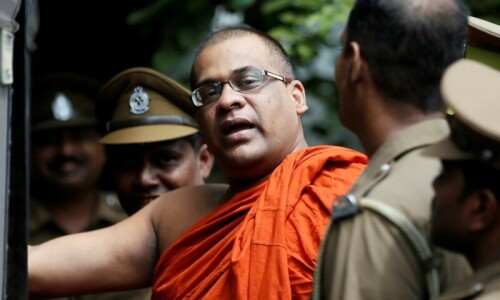The inclusion of women with disabilities in the economy is imperative for achieving the overall goal of women's economic empowerment, said experts at a dialogue on 'Leaving no one behind — opportunities and challenges for promoting women’s economic empowerment with focus on women with disabilities' organised by UN Women Pakistan in Islamabad on Tuesday.
The event was organised under the project ‘Moving from charity model to rights-based work – delivering as one for empowerment of Women with Disabilities’. In line with the initiative, UN Women is working to advance the rights of women with disabilities to employment and a life free of violence by increasing their recognition as rights holders, decreasing the vulnerability, stigma and discrimination associated with disability, and enhancing the capacity of disabled persons organisations.
Examine: How empowering women can boost our declining economy
Addressing the event, Ambassador of Norway to Pakistan Kjell-Gunnar Eriksen said that improving the economic situation of women is beneficial to society as it accelerates development and contributes to reducing poverty.
“A long-standing champion of gender equality, the Government of Norway has been a key supporter of UN Women in Pakistan since the inception of its flagship programme on empowerment of women Home-Based Workers (HBWs). Approximately 40,000 rights holders – women HBWs and members from excluded groups, such as women with disabilities and transgender persons – residing in 23 districts of Pakistan have benefited from this partnership,” the envoy noted.
Knut Ostby, the resident coordinator of United Nations in Pakistan, told the audience, “The empowerment of women is a central factor in building strong economies and establishing more stable and just societies. According to recent statistics, the Pakistani economy could get a 30 per cent boost in GDP by closing the gender gap.”
Ministry of Human Rights Secretary Rabia Javeri Agha observed that while Pakistan has many women in all spheres of life who have made the country proud, it still ranks 151 on the Global Gender Gap Index. Pakistani women constitute only one-fourth of the workforce while the majority of them are engaged in the informal sector, working without legal protection.
“Empowerment is a complex and cross-cutting issue. No government can do it alone. We all need to take up joint initiatives for the social and economic empowerment of women in Pakistan,” she said.
Earlier, UN Women Pakistan Deputy Country Representative Aisha Mukhtar in her opening remarks noted that women remain less likely to participate in the labour market and are over-represented in the informal sector. "This lack of participation in [the] formal sector affects women as they cannot break out of poverty, face discrimination and exploitation, and this also affects [the] economy because when more women work, economy grows,” she added.
During the event, three women — a visually impaired woman, a polio-affected woman and a home-based worker from Karachi — shared their stories of struggle and success with the audience.
A panel discussion on the role of private sector companies in promoting women’s economic empowerment was also arranged with panellists representing Telenor Pakistan, Unilever Pakistan, Nestlé Pakistan and Procter & Gamble Pakistan. The discussion was moderated by Bilal Shaikh, the head of internal business development at Eighteen.
















































Dear visitor, the comments section is undergoing an overhaul and will return soon.